- Home
- /
- Resources
- /
- Latest News
UR+ BC Panelist: Tamsin Lyle
Engineer Tamsin Lyle founded Ebbwater Consulting, a Vancouver-based company, to focus on flood management solutions. Today Tamsin is a well-known thought leader on flood management and issues in Canada, working across the country to help develop effective flood policy and help communities take action to mitigate their risk from hazardous floods.
Tamsin will be a panelist in the kick-off plenary session at the UR+BC symposium on April 16th in Victoria.
1. How can thoughtful flood management help communities reduce their risk from future flood events?
Floods matter; they matter a lot. People whose homes are inundated will remember for the rest of their lives; landscapes are changed forever; regional and national economies suffer. Floods are consistently Canada's most costly natural disaster culminating in 2013 with the Southern Alberta floods that resulted in approximately $6.1Bn of direct damages, in addition to enormous long-term impacts to the environment and to people. Best practice for flood planning and risk reduction requires a paradigm shift in thinking away from the dominant historic approach to "fight nature". What we need is a more thoughtful approach where we learn to 'live with nature'. This more thoughtful approach has many dimensions:
- Plan for Risk not Hazard: International best practice in the form of the UN-ISDR Sendai Framework provides some guidance on how to mitigate risks and increasing costs associated with natural disasters. A major tenet of this framework is a risk-based approach to disaster management, where hazard, vulnerability, likelihood and consequence all play a role. This is a shift away from how floods have historically been managed in Canada, where design standards – based on a single hazard, often the 0.5% AEP (or 200-year) event – are the norm. Common-sense clearly dictates that an understanding of what is at stake (exposure and consequence) should play a role in any flood planning.
- Stop fighting nature, and enable resilience: The approach to dealing with floods has evolved with time. During the International Decade of Natural Disaster Risk Reduction, the UN expressed the view that the approach to disaster management was too compartmentalized and that flood protection in isolation was no longer appropriate[1]. Complete protection from floods through the construction of dikes and dams, for example, is often too expensive and an inefficient use of resources. A more integrated resilience approach is increasingly being adopted[2]. Resilience refers to the resistance to a particular shock and the speed of recovery. Focusing on appropriate and cost-effective resistance to flooding combined with increased speed of recovery should be the focus. Peak flows and storms will continue to happen and flooding can't be completely prevented, however, we can become more resilient to these events.
- Embrace uncertainty: Climate is changing – this fact is known. However, the rate and pace of change in the region is not clear. This is best managed by acknowledging the uncertainty, and then explicitly designing for it. For example, structural responses should be designed to change over time (for example by purchasing larger rights-of-way for dikes so that they can be raised and widened in future). And all responses should be designed with the idea of 'safe-failure' and multiple benefits – so that even if the infrastructure doesn't function for its initial purpose it continues to provide value to the community.
- Listen to stakeholders and consider local values: Communities don't want elaborate flood control infrastructure, they want safe and prosperous places to live; this should be at the heart of any flood mitigation plan. One strategy to reduce natural hazard risk while delivering additional value to the community is designing multifunctional spaces. This could be in the form of a park which is a recreation space when it's dry and a retention area during heavy rainfall or peak flows. In areas where dikes have been constructed sometimes, they also incorporate trails or bike paths for recreation. What form this should take all depends on what the community wants and how this can be integrated with project needs and the available budget. This plan should be developed in collaboration with the community and industry to balance local needs.
- Make good decisions based on more than dollars and cents: Risk reduction measures need to be cost-effective, but making sound decisions needs to be based on more than just the price tag. Flood infrastructure should also provide benefits and minimise impact to social, environmental and cultural assets – if only direct losses to structures are considered in a benefit-cost assessment – then the result is generally the construction of dikes or seawalls. However, when ecological, recreational and cultural values are considered meaningfully – then the preferred mitigation option is rarely a piece of hard infrastructure that impacts the environment, blocks views and requires long-term maintenance. A thoughtful decision process is imperative to create a resilient community.
2. Can you share a particular example that stands out for you of where 'thoughtful flood management' has saved lives and/or property?
To turn this question on its head – we have numerous examples around the world where traditional approaches to flood management (dikes and more and higher dikes) don't work. We have seen catastrophic engineering failures of flood protection structures in the news – for example in New Orleans during Hurricane Katrina or along the Japanese coast during the 2011 Great Earthquake and Tsunami. Closer to home – we have seen riparian areas be degraded over time with the construction of dikes and associated hardening of the river's edge with rip-rap. The structures we have built – work for a singular purpose – until they fail, and while they exist – they degrade our environment and social and cultural attachment to natural river corridors. Around the world, we are seeing a movement away from a purely engineered approach to managing flood waters – to a values-based approach where 'living with water' becomes a goal. This is being practiced across Europe – and closer to home through the Floodplains by Design program in Washington State – where floodplains are being reconnected to rivers, fish and farms are thriving, and local communities remain resilient.
3. What kind of advice do you have for the construction sector when considering building to mitigate flood risk?
Given a move towards resiliency and quick recovery from floodwaters rather than an assumption that we can stop the water – there is a strong need for the building and construction community to innovate. We need homes that can get wet – but be useable post-flood. Flood-resilient building design is taking off around the world – especially in areas where population density has meant that floodplains cannot be sterilized. We need to bring some of these ideas to Canada – from floating homes and elevated homes to different types of flooring and plastering materials in the Homeowners Guide to Flood Resilience, to new building codes requiring tanking or elevation of electrics.
UR+ BC Panelist: Jessica Shoubridge
Get Understanding Risk BC tickets here
.jpg)
BC Construction Association Contracts Fairley Strategies to Advise on Industry Advocacy Efforts Regarding Construction Procurement
.png)
BCCA Statement Regarding Compulsory Trades

Construction Workers Get Fast-Tracked for Covid Vaccine in Vancouver

BC Hydro and Site C Contractors Launch Canada's First Builders Code Work Site

Four British Columbians Recognized for Extraordinary Safety Leadership During Pandemic
.jpg)
Construction File - Building Back Smarter:
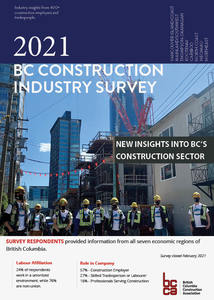
Latest Construction Industry Statistics Reveal Strength Despite Pandemic Challenges
.png)
BCCA Response to BC Budget 2021
.jpg)
BCCA Wins National Award for Second Consecutive Year

BC Restaurants to Benefit From Construction Month Celebrations This April
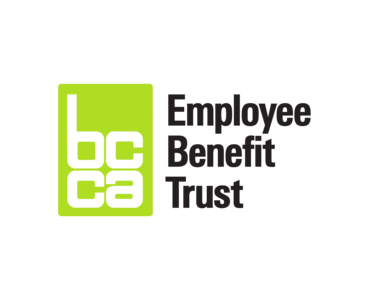
Christy Kerr of Kerr Controls Inc. To Chair BCCA Employee Benefit Trust Board of Trustees


Letters to the Vancouver Sun: Legislate Prompt Payments for the Construction Industry

Builders Code Champion Awards Celebrate Culture Change In BC’s Construction Industry

BC Construction Association Announces New Board Chair
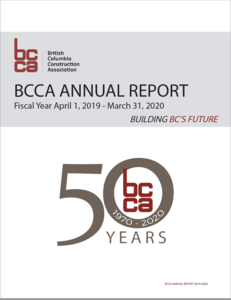
BCCA Releases it's 2020 Annual Report
BCCA to hold 2020 Annual General Meeting (AGM) Virtually
-01.png)
BC Construction Association Recognized for Achievements in Workforce Development with National Award

BC Construction Sector Awards to Recognize Workplace Diversity

Construction Sector United in Fight Against COVID-19
 (banner-large)-01.png)
Construction Culture Training Goes Virtual During Covid-19 Crisis
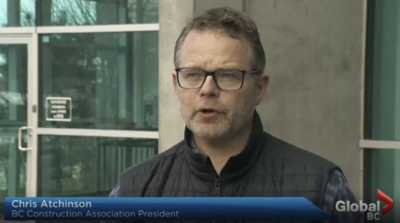
BCCA President, Chris Atchison Speaks to Global News About Safety Being the Most Urgent Priority on Construction Sites

BCCA Signs Agreement with eSolutionsGroup to Power BidCentral Platform
Business, Indigenous, and Community Leaders Call for a Return to Order
BCCA Responds to BC Government & Wet’suwet’en Leaders Agreement

BCCA Statement regarding COVID-19 coronavirus
BuildForce Canada 2020 Construction & Maintenance Looking Forward Report

Inaugural Builders Code Champion Awards Celebrate Construction Sector Leadership

BCCA Celebrates National Construction Day with New Worksite Behavior Training App
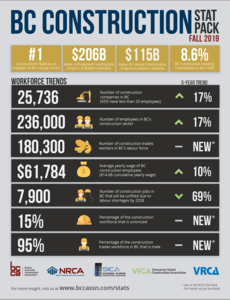
Fall 2019 Statistics Show Progress on Key Construction Sector Indicators
BCCA to hold 2019 Annual General Meeting in Prince George
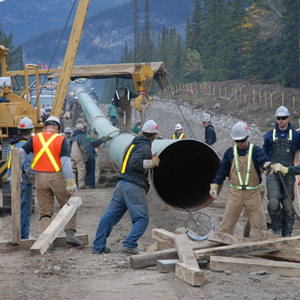
BCCA Welcomes Trans Mountain Announcement Resuming Work on Pipeline Expansion Project
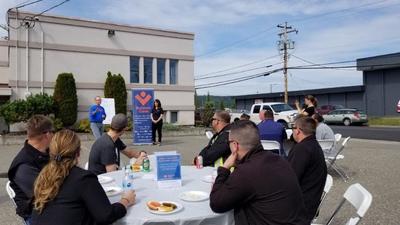
Builders Code Ramps Up Services Across Northern Region
Court ruling allows construction industry stakeholder coalition to proceed through the B.C. Supreme Court with CBA challenge
Aligning the Construction and Technology Sectors
Multibillion Dollar BC Construction Sector Untapped by Tech
BCCA Commends Ruling in Favour of Trans Mountain Pipeline Project
BCCA Update on Private Members Bill for Prompt Payment
BCCA Response to Proposed Labour Code and Employment Standards Legislation

New Builders Code Training Program Gives Construction Leaders the Tools to Address Worksite Harassment, Hazing and Bullying
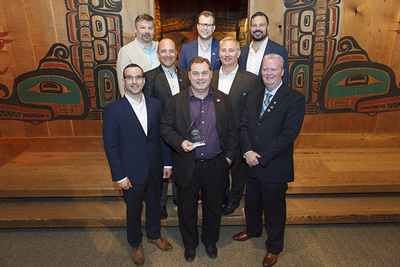
Six BC Employers Win Construction Leadership Awards
CBC Interview: Builders Code "Don' t Be A Tool" campaign
CHNL Interview: Construction Month 2019

BC Construction Month Launches with Latest Industry Statistics and Results of Province-Wide Industry Survey

Builders Code Expansion: First Advisor Now Available to Vancouver Island Construction Employers
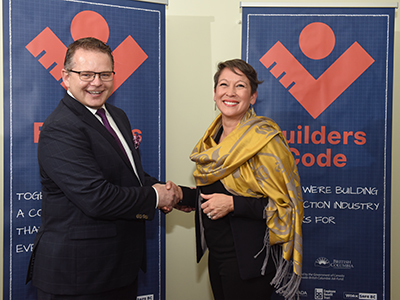
BC Construction Industry Introduces Worksite Conduct Standards to Improve Worker Retention
Risk Alerts Issued for Two Provincial Construction Projects
Contractor Alert - Westwood Court Prime Contractor Services
Contractor Alert - Hart Haven Group Home at Dagg Rd

Supporting BC's Skilled Workforce

British Columbia Construction Association Selected to Provide Pre-Arrival Services

A Dynamic Year In BC’s Construction Industry – Skilled Workforce Shortage Still The #1 Issue

Kinetic Construction Courts Young Hockey Players in Bid to Draw More Youth to Career Opportunities in the Trades

Angela McKerlich of CapriCMW Insurance Services Ltd. Elected BC Construction Association Board Chair

LNG CANADA Invests in BC and Canada: A Generational Milestone Achieved

BC 2018 Labour Market Outlook Released
.png)
BCCA Integrated Membership Update 2017
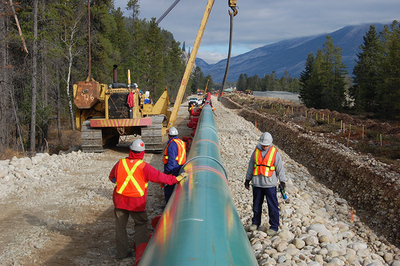
Response to Federal Court of Appeal's Trans Mountain Pipeline Decision
.jpg)
New BC Building and Plumbing Code 2018

Industry Policies that further validate BCCA’s challenge of the Community Benefits Agreement

Industry Voices - Industry Must Come Together
.png)
BCCA does not support Premier Horgan’s new Community Benefits Agreement
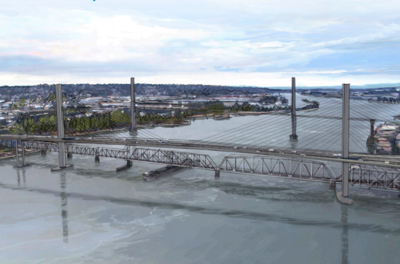
Pattullo Procurement Strategy Takes BC Construction a Bridge Too Far
.png)
B.C. needs Ministry of the Built Environment to manage construction issues

Response to the Province’s Community Benefits Agreement Announcement
.png)
Tackling the Late Payment Epidemic: What Will It Take?
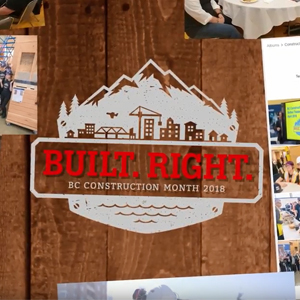
Construction Month in BC 2018 Recap Video #BuiltRight
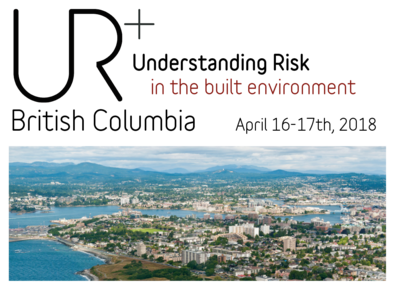
Understanding Risk British Columbia (UR+ BC) Video #URBC

BCCA Response to Federal Purchase of Trans Mountain pipeline for $4.5 Billion

Dodge Momentum Index Moves Higher in April

BC Lions Announce "Salute the Trades" Game Night September 7

LNG Canada and TransCanada's Coastal GasLink Project Announce Expansion of "Connect" Program
.jpg)
.PNG)